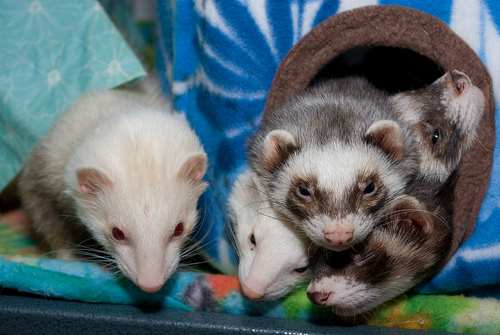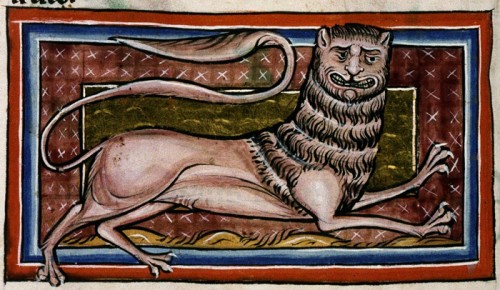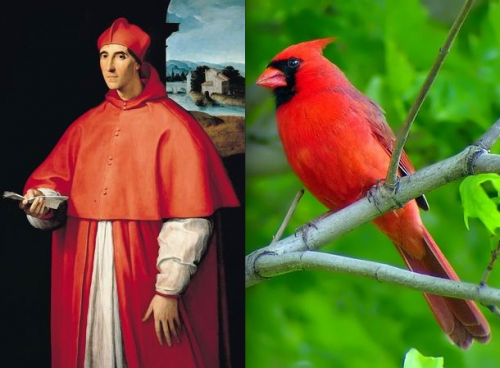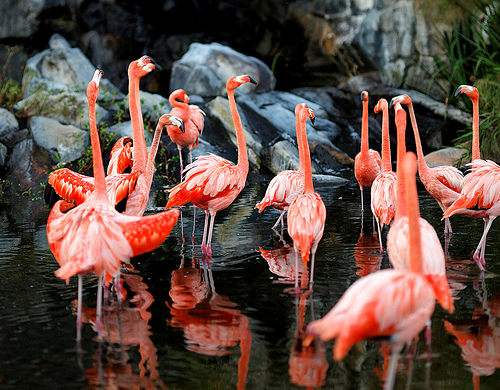GORILLA
“First used in a Greek translation of 5th century BC Carthaginian explorer Hanno’s account of a voyage to West Africa. He reported encountering a tribe of wild hairy people, whose females were, according to a local interpreter, called gorillas. In 1847 the American missionary and scientist Thomas Savage adopted the word as the species name of the great ape and by the 1850s it had passed into general use.” (From Dictionary of Word Origins, by John Ayto)
FERRET
 (Image credit: Flickr user Stacy Lynn Baum)
(Image credit: Flickr user Stacy Lynn Baum)“Ferret comes from the Latin furritus, for ‘little thief,’ which probably alludes to the fact that ferrets, which are related to pole cats, like to steal hens’ eggs. Its name also developed into a verb, to ferret out, meaning ‘to dig out or bring something to light.’” (From Cool Cats, Top Dogs, and Other Beastly Expressions, by Christine Ammer)
SKUNK
“Because the little striped animal could squirt his foul yellow spray up to 12 feet, American Indians called him segankw, or segonku, the Algonquin dialect word meaning simply ‘he who squirts’. Early pioneers corrupted the hard-to-pronounce Algonquin word to skunk, and that way it has remained ever since.” (From Animal Crackers, by Robert Hendrickson)
HOUND
“Before the Norman conquest of England, French hunters bred a keen-nosed dog that they called the St. Hubert. One of their rulers, William, took a pack to England and hunted deer-following the dogs on foot. Saxons had never before seen a dog fierce enough to seize its prey, so they named William’s animals hunts, meaning ’seizure’. Altered over time to hound, it was long applied to all hunting dogs. Then the meaning narrowed to stand for breeds that follow their quarry by scent.” (From Why You Say It, by Webb Garrison)
LEOPARD
 (Image source: The Medieval Bestiary)
(Image source: The Medieval Bestiary)“It was once wrongly believed that the leopard was a cross between a ‘leo’ (a lion) and a ‘pard’ (a white panther)-hence the name ‘leopard.’” (From Why Do We Say It?, by Nigel Rees)
PYTHON
“According to Greek legend, the god Apollo’s earliest adventure was the single-handed slaying of Python, a flame-breathing dragon who blocked his way to Pytho (now Delphi), the site he had chosen for an oracle. From the name of this monster derives the name of the large snake of Asia, Africa, and Australia, the python.” (From Thou Improper, Thou Uncommon Noun, by Willard R. Espy)
CARDINAL

“One would think that such an attractive creature would have given its name to many things, but in fact it is the other way around. The bird’s name comes from the red-robed official of the Roman Catholic Church, who in turn was named for being so important-that is, from the adjective cardinal, from the Latin cardo, meaning ‘hinge’ or ‘pivot’. Anything cardinal was so important that events depended (hinged or pivoted) on it.” (From It’s Raining Cats and Dogs, by Christine Ammer)
MOOSE
“Captain John Smith, one of the original leaders at Jamestown, wrote accounts of the colony and life in Virginia, in which he defined the creatures as Moos, a beast bigger than a stagge. Moos was from Natick (Indian) dialect and probably derived from moosu, ‘he trims, he shaves,’ a reference to the way the animal rips the bark and lower branches from trees while feeding.” (From The Chronology of Words and Phrases, by Linda and Roger Flavell)
FLAMINGO
 (Image credit: Flickr user Luis Argerich )
(Image credit: Flickr user Luis Argerich )“This long-legged pink wading bird is named for the people of Flanders, the Flemings, as they were called. Flemings were widely known for their lively personalities, their flushed complexions, and their love of bright clothing. Spaniard explorers in the New World thought it was a great joke naming the bird flamingo, which means ‘a Fleming’ in Spanish.” (From Facts on File Encyclopedia of Words and Phrase Origins, by Robert Hendrickson)

No comments:
Post a Comment